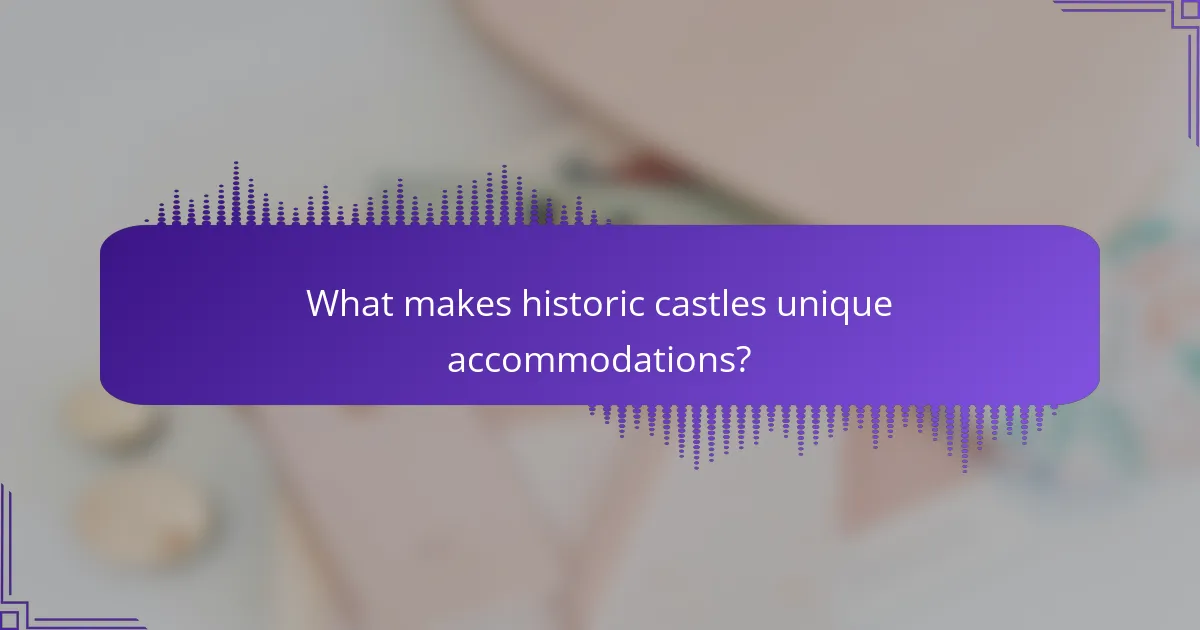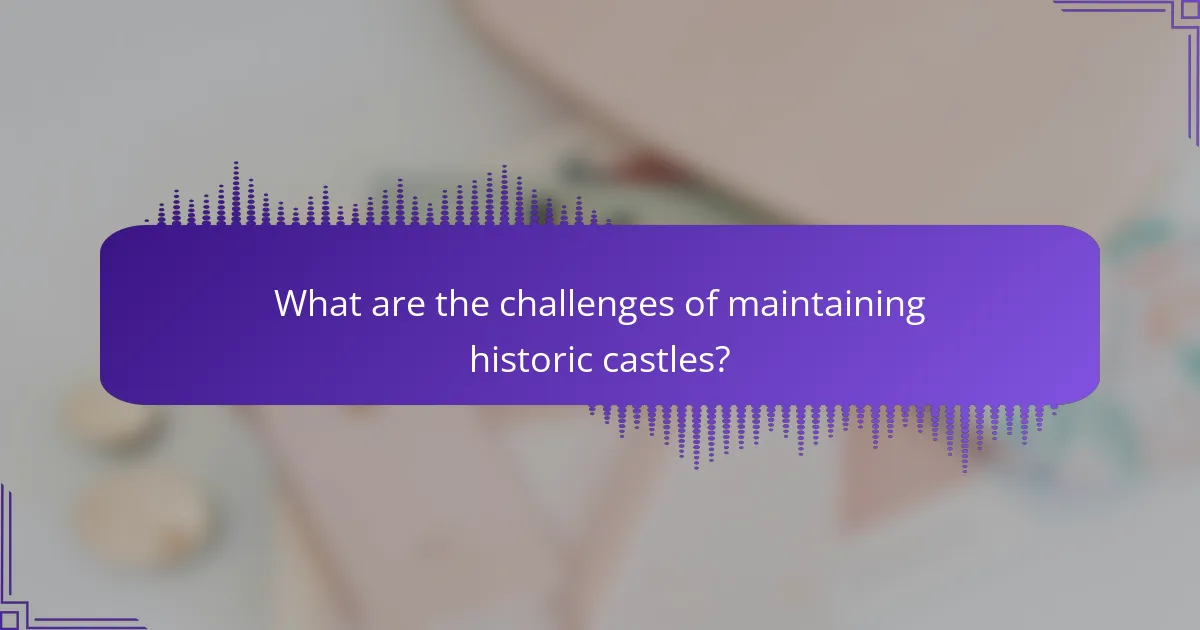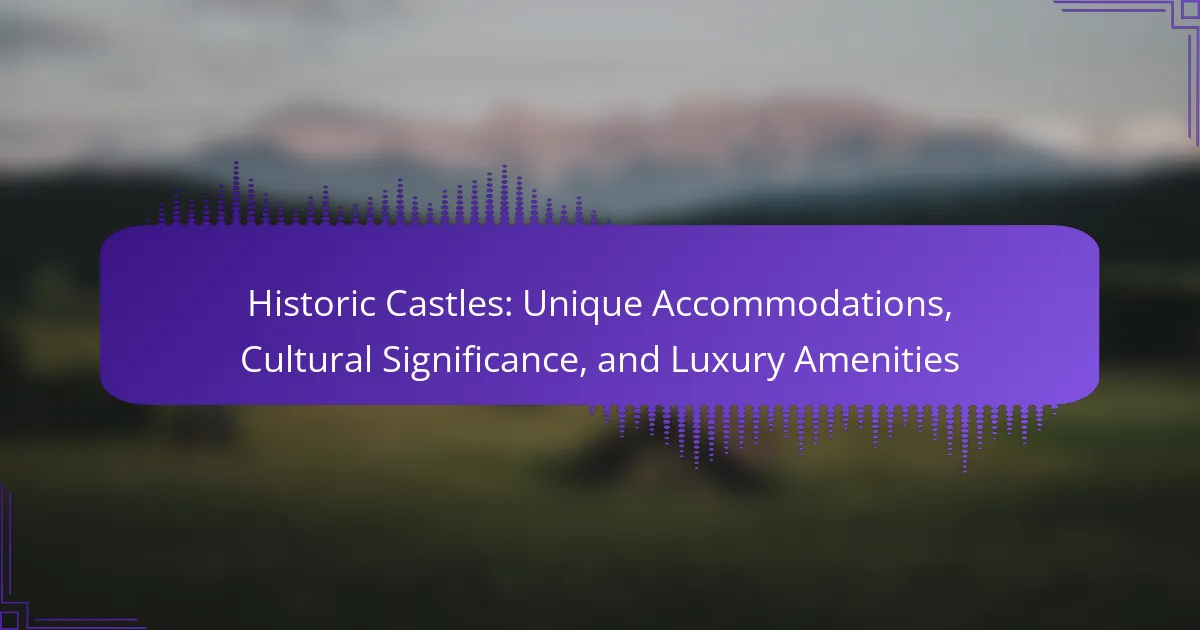Historic castles provide a unique accommodation experience, combining cultural significance with luxury amenities. This article explores their architectural grandeur, the challenges of preservation, and the exclusive offerings that enhance guest stays. Discover how these historic sites serve as symbols of heritage while attracting tourism and contributing to local economies.

What makes historic castles unique accommodations?
Historic castles offer unique accommodations due to their rich history, architectural grandeur, and luxurious amenities. Guests experience a blend of cultural significance and opulence, often enjoying features like original furnishings and breathtaking landscapes. Many castles provide exclusive dining experiences, spa services, and guided tours, enhancing the stay with a sense of royal indulgence. The rarity of staying in such historic settings adds to the overall allure, making each visit a memorable escape into the past.
How do architectural styles influence guest experiences?
Architectural styles significantly enhance guest experiences in historic castles by creating immersive atmospheres. The grandeur of Gothic arches or the elegance of Renaissance design evoke a sense of history, making stays memorable. Unique attributes, such as original stonework and period furnishings, provide cultural significance that enriches the visit. Luxury amenities, like modernized bathrooms and gourmet dining, blend seamlessly with these historic features, ensuring comfort without sacrificing authenticity. This fusion of past and present elevates the overall guest experience, encouraging deeper appreciation of the architectural heritage.
Which amenities enhance the luxury of castle stays?
Luxurious amenities in castle stays include gourmet dining, spa services, personalized butler service, historic tours, and exclusive access to private areas. These features enhance comfort and offer unique experiences, connecting guests to the castle’s rich heritage. For instance, some castles provide wine tasting events featuring local vintages, adding to the cultural immersion.
How do castle accommodations differ across regions?
Castle accommodations differ significantly across regions due to local history, architecture, and cultural influences. In Europe, many castles offer luxurious stays with modern amenities while preserving historical features. For instance, Scottish castles often emphasize traditional decor and rugged landscapes, whereas French châteaux highlight elegance and fine dining experiences.
In contrast, Asian castle accommodations may integrate local customs and aesthetics. Japanese castles, for example, provide a unique blend of historical significance and serene gardens, often accompanied by traditional tea ceremonies.
Additionally, the pricing and availability of castle accommodations vary widely. In some regions, such as the UK, castles can be more accessible to tourists, while others may be exclusive or require advanced bookings.
Overall, the differences in castle accommodations reflect the unique cultural narratives and historical contexts of each region.

What cultural significance do historic castles hold?
Historic castles hold significant cultural importance as symbols of heritage, history, and architectural achievement. They represent the power dynamics of their eras, often serving as royal residences or military strongholds. Many castles are associated with local legends and folklore, enriching community identity. Additionally, they attract tourism, contributing to economic growth while preserving cultural narratives. Their unique architectural styles reflect the technological advancements and artistic trends of their time, making them valuable historical artifacts.
How have castles influenced local heritage and identity?
Historic castles significantly shape local heritage and identity through their architectural grandeur and historical narratives. They serve as symbols of regional pride and attract tourism, which fosters community engagement. Castles often host cultural events, reinforcing traditions and local customs. Their preservation connects communities to their past, creating a sense of belonging. Unique attributes like specific architectural styles or historical events associated with each castle enhance their cultural significance.
Which events and festivals celebrate castle history?
Several events and festivals celebrate castle history across various regions. Notable examples include the Castle Festival in Germany, which showcases medieval reenactments and local crafts. The Edinburgh Castle Tattoo in Scotland features military performances against the castle’s backdrop. The Loire Valley Châteaux Festival in France celebrates the architectural beauty and heritage of its castles through guided tours and cultural events. Additionally, the Castle of Good Hope Heritage Day in South Africa highlights the historical significance of this landmark with exhibitions and performances. These events enhance cultural appreciation and tourism associated with historic castles.
What role do castles play in tourism and local economies?
Historic castles significantly enhance tourism and local economies by attracting visitors and generating revenue. These unique accommodations offer immersive experiences that combine cultural significance with luxury amenities.
Visitors are drawn to castles for their historical value, often participating in guided tours, events, and exhibitions. This influx of tourists stimulates local businesses, from restaurants to shops, creating jobs and boosting the economy.
Additionally, many castles host special events such as weddings and festivals, providing further economic benefits. The preservation of these historic sites also encourages investment in infrastructure and community development, ensuring long-term sustainability.
In summary, historic castles serve as vital economic engines, enriching local cultures while providing unique travel experiences.

What are the challenges of maintaining historic castles?
Maintaining historic castles presents significant challenges due to their age, structural integrity, and conservation needs. Preservation requires specialized knowledge and resources to address deterioration, weather damage, and historical accuracy.
One major challenge is funding for ongoing maintenance and restoration projects. Many castles are publicly owned or operated as museums, relying on government support or visitor revenue. This financial pressure can limit the extent of necessary repairs.
Another challenge involves adhering to preservation standards. Restoration must respect the original architecture and materials, which can be difficult to source. Additionally, modern safety regulations complicate renovations, requiring innovative solutions that do not compromise historical value.
Environmental factors also play a role. Historic castles often face threats from climate change, including increased moisture and temperature fluctuations. This can accelerate wear and tear, necessitating more frequent and costly interventions.
How do preservation efforts vary by region?
Preservation efforts for historic castles vary significantly by region due to cultural, historical, and economic factors. In Europe, many countries prioritize restoration and tourism, investing in luxury accommodations within castles. For instance, the UK emphasizes maintaining authenticity while enhancing visitor experiences. In contrast, regions like Eastern Europe face challenges with funding, leading to less comprehensive preservation. Additionally, some areas focus on adaptive reuse, transforming castles into modern facilities while preserving their historical essence. Each region’s approach reflects its unique cultural significance and available resources.
What funding options are available for castle restoration?
Funding options for castle restoration include government grants, private donations, crowdfunding, and heritage conservation funds. Each option provides unique benefits to support preservation efforts.
Government grants often focus on cultural heritage, offering substantial financial support. Private donations can come from individuals or organizations passionate about history. Crowdfunding allows for community engagement, enabling many to contribute small amounts. Heritage conservation funds specifically target historic sites, ensuring their maintenance and restoration.
Which innovative solutions are being implemented for sustainability?
Historic castles are implementing innovative solutions like renewable energy systems, water conservation techniques, and sustainable materials to enhance sustainability. These adaptations not only preserve cultural significance but also provide unique accommodations that appeal to eco-conscious travelers. For example, solar panels and rainwater harvesting systems are becoming common, reducing the environmental impact while maintaining luxury amenities. As a result, these historic sites can offer an enriching experience that aligns with modern sustainability goals.

How do visitors perceive the value of staying in a historic castle?
Visitors perceive the value of staying in a historic castle as a blend of unique experiences, cultural immersion, and luxury amenities. These accommodations often feature rich histories, captivating architecture, and personalized service, enhancing the overall stay. Many guests appreciate the opportunity to engage with the past, as castles frequently offer tours and educational programs. Additionally, the luxurious amenities, such as fine dining and spa services, elevate the experience, making it memorable. Overall, the charm and exclusivity of historic castles create a compelling value proposition for visitors seeking a distinctive getaway.
What factors influence guest satisfaction and reviews?
Guest satisfaction and reviews in historic castles are influenced by unique accommodations, cultural significance, and luxury amenities. Guests appreciate the immersive experience of staying in a castle, which often includes historical tours and local cultural events. The quality of service and attention to detail also significantly impact reviews. For instance, personalized services and well-maintained facilities enhance guest experiences. Additionally, the availability of modern amenities, such as spa services and gourmet dining, can elevate satisfaction levels. Overall, a blend of historical charm and contemporary luxury drives positive feedback.
How do cultural perceptions shape the demand for castle stays?
Cultural perceptions significantly influence the demand for castle stays by associating them with luxury and history. Many view castle accommodations as unique experiences that offer a glimpse into the past. This perception enhances their appeal, especially among tourists seeking authentic cultural experiences. The allure of staying in a historic castle often stems from its architectural grandeur and the stories tied to its heritage. Additionally, cultural narratives around nobility and exclusivity further elevate the desirability of these stays. As a result, demand increases in regions where castles are integral to the local identity and tourism strategy.
What are the most common misconceptions about castle accommodations?
Many believe that staying in a historic castle means sacrificing comfort for authenticity. In reality, castle accommodations often provide modern luxury amenities alongside rich cultural experiences. Another misconception is that these stays are exclusively for the wealthy; many castles offer affordable options. Additionally, some think castles are isolated, but many are conveniently located near attractions. Lastly, there’s a belief that castles lack privacy, while many feature private rooms and suites that ensure a tranquil stay.
What practical tips can enhance your castle accommodation experience?
To enhance your castle accommodation experience, prioritize comfort, explore cultural offerings, and engage with local history. Consider these practical tips:
1. Research the castle’s history to appreciate its significance.
2. Opt for guided tours to gain deeper insights into the architecture and artifacts.
3. Try local cuisine offered in castle dining options for an authentic experience.
4. Participate in themed events or activities hosted by the castle.
5. Choose accommodations with luxury amenities for added comfort and relaxation.
